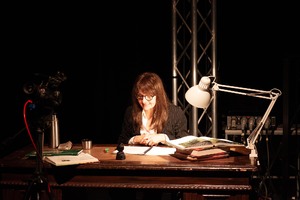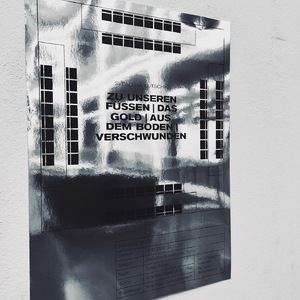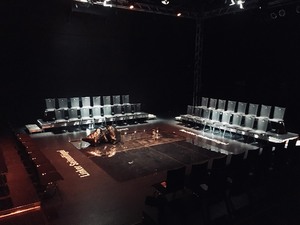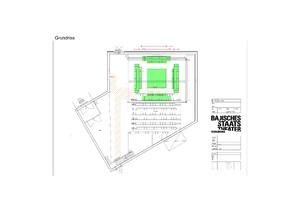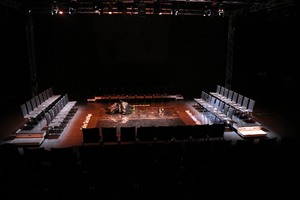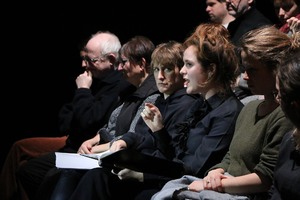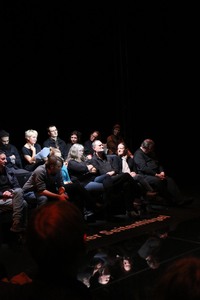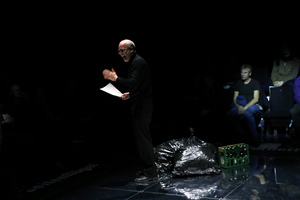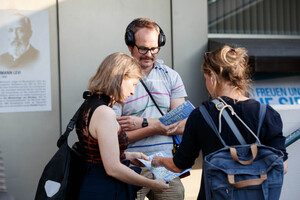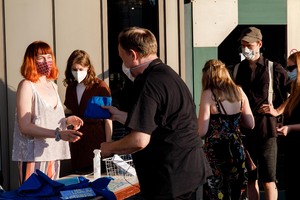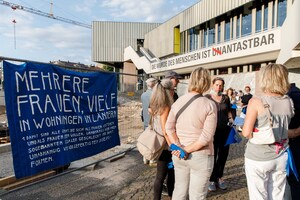"Badisches Staatstheater"
| Begriff | Badisches Staatstheater |
| Metakey | Beteiligte Institution(en) (creative_work:other_institutions) |
| Typ | Keyword |
| Vokabular | Werk |
51 Inhalte
- Seite 1 von 5
DNS #65
- Titel
- DNS #65
- Untertitel
- Bookpink
- Autor/in
- Beschreibung (de)
- In sieben komisch-poetischen Miniaturen beschreibt Caren Jeß menschliche Abgründe im Gewand von Federtieren wie dem Dreckspfau, der Sumpfmeise, tanzenden Flamingos oder dem Bussard im Beton der Vernunft. Ein Stück voller Humor, subtilem Wortwitz und draller Situationskomik.
- Beschreibung (en)
- In seven comic-poetic miniatures, Caren Jeß describes human abysses in the guise of feathered creatures such as the peacock, the marsh tit, dancing flamingos or the buzzard in the concrete of reason. A play full of humor, subtle wordplay and gritty situation comedy.
- Typ des Projekts/Werks
- Schlagworte
- Datierung
- 27.02.2020
- Mitwirkende
- Sprache
- Dauer
- 1 Stunde 30 Minuten
- Ort: Institution
- Ort
- Studio
- Stadt
- Land
- Beteiligte Institution(en)
- Bemerkungen
- Szenische Lesung und Autor*innengespräch
Bühne/Kostüm: Paula Klotzki, Jana Trampert, Cara Kollmann, Julia Ihls
Dramaturgie: Nele Lindemann, Anna Haas
Regie: Tobias Döhmer
SchauspielerInnen: Antonia Mohr, Jannek Petri, Alisa Kunina, Pål Fredrik Kvale, Constantin Petry
Plakat: Julia Ihls
- Szenische Lesung und Autor*innengespräch
- Titel
- DNS #65
- Urheberrechtshinweis
- Cara Kollmann
- Rechtsschutz/Lizenz
- Medienersteller/in
- Beziehung/Funktion
- Projektleiter/in
- Semester
- Studiengang
- Lehrveranstaltung
- Importiert am
- 19.12.2023
- Übergeordnete Sets
- 1
DNS #63
- Titel
- DNS #63
- Untertitel
- Zu unseren Füßen, das Gold, aus dem Boden Verschwunden
- Autor/in
- Beschreibung (de)
-
Ein Wohnhaus in Berlin: darin ein alter Trinker, ein lesbisches Paar, ein Geflüchteter, eine depressive Frau und ihr Ex-Mann. Im Stück „Zu unseren Füßen, das Gold, aus dem Boden verschwunden“ von Svealena Kutschke entspinnen sich im Alltag jener Figuren Fragen nach unserem Umgang mit dem Fremdem – sei es kultureller oder ideologischer Couleur. Die voyeuristische Situation, in welcher sich jegliche Erkenntnis nur durch die Blicke und Zuschreibungen der Nachbarn vollzieht, wurde hierfür in eine panoptische Szenografie übersetzt. Darin bewohnen die Schauspieler gemeinsam mit den Zuschauern Vorder- und Hinterhaus sowie die Seitenflügel, um so gleichsam eine diskursive wie affizierende Arena aufzuspannen. In der Mitte, ein Spiegel. Jene Leerstelle fungiert zugleich – in Form des Hinterhofs – als Austragungsort der einsamen Monologe wie auch als räumlicher Akteur für den, in der Besetzung nicht vorgesehenen, Flüchtling. Ob und wie jene Figur durch die Spiegelreflexion eine Stimme erlangt oder ob die Anwesenden in der Betrachtung lediglich auf sich selbst zurückgeworfen werden, bleibt bewusst eine offene, ungelöste Frage.
-
- Beschreibung (en)
-
An apartment building in Berlin: an old drunk, a lesbian couple, a refugee, a depressed woman and her ex-husband. In Svealena Kutschke's play "Zu unseren Füßen, das Gold, aus dem Boden verschwunden" (At our feet, the gold that has disappeared from the ground), questions about how we deal with the foreign - be it of a cultural or ideological nature - arise in the everyday lives of these characters. The voyeuristic situation, in which all knowledge is only gained through the gazes and attributions of the neighbors, was translated into a panoptic scenography. In it, the actors inhabit the front and back houses as well as the side wings together with the audience in order to create an arena that is both discursive and affirmative. In the middle, a mirror. This empty space functions simultaneously - in the form of the backyard - as a venue for the solitary monologues and as a spatial actor for the refugee, who is not included in the cast. Whether and how this figure acquires a voice through the mirror reflection or whether those present are merely thrown back on themselves in the reflection deliberately remains an open, unresolved question.
-
- Typ des Projekts/Werks
- Schlagworte
- Datierung
- 13.12.2019
- Mitwirkende
- Sprache
- Ort: Institution
- Ort
- Studio
- Stadt
- Land
- Beteiligte Institution(en)
- Bemerkungen
- Szenische Lesung
Bühne: Julia Ihls und Gloria Müller, ADSZ Hfg Karslruhe WS 2019/2020
Regie: Tobias Dömer
Dramaturgie: Nele Lindemann, Anna Haas
Mit: Ute Baggeröhr, Marie-Joelle Blazejewski, Antonia Mohr, Sven Daniel Bühler, Timo Tank
- Szenische Lesung
- Titel
- DNS #63
- Urheberrechtshinweis
- Julia Ihls und Paulina Mimberg
- Rechtsschutz/Lizenz
- Medienersteller/in
- Beziehung/Funktion
- Projektleiter/in
- Semester
- Studiengang
- Lehrveranstaltung
- Importiert am
- 19.12.2023
- Übergeordnete Sets
- 1
DNS #63
- Titel
- DNS #63
- Untertitel
- Zu unseren Füßen, das Gold, aus dem Boden Verschwunden
- Autor/in
- Beschreibung (de)
-
Ein Wohnhaus in Berlin: darin ein alter Trinker, ein lesbisches Paar, ein Geflüchteter, eine depressive Frau und ihr Ex-Mann. Im Stück „Zu unseren Füßen, das Gold, aus dem Boden verschwunden“ von Svealena Kutschke entspinnen sich im Alltag jener Figuren Fragen nach unserem Umgang mit dem Fremdem – sei es kultureller oder ideologischer Couleur. Die voyeuristische Situation, in welcher sich jegliche Erkenntnis nur durch die Blicke und Zuschreibungen der Nachbarn vollzieht, wurde hierfür in eine panoptische Szenografie übersetzt. Darin bewohnen die Schauspieler gemeinsam mit den Zuschauern Vorder- und Hinterhaus sowie die Seitenflügel, um so gleichsam eine diskursive wie affizierende Arena aufzuspannen. In der Mitte, ein Spiegel. Jene Leerstelle fungiert zugleich – in Form des Hinterhofs – als Austragungsort der einsamen Monologe wie auch als räumlicher Akteur für den, in der Besetzung nicht vorgesehenen, Flüchtling. Ob und wie jene Figur durch die Spiegelreflexion eine Stimme erlangt oder ob die Anwesenden in der Betrachtung lediglich auf sich selbst zurückgeworfen werden, bleibt bewusst eine offene, ungelöste Frage.
-
- Beschreibung (en)
-
An apartment building in Berlin: an old drunk, a lesbian couple, a refugee, a depressed woman and her ex-husband. In Svealena Kutschke's play "Zu unseren Füßen, das Gold, aus dem Boden verschwunden" (At our feet, the gold that has disappeared from the ground), questions about how we deal with the foreign - be it of a cultural or ideological nature - arise in the everyday lives of these characters. The voyeuristic situation, in which all knowledge is only gained through the gazes and attributions of the neighbors, was translated into a panoptic scenography. In it, the actors inhabit the front and back houses as well as the side wings together with the audience in order to create an arena that is both discursive and affirmative. In the middle, a mirror. This empty space functions simultaneously - in the form of the backyard - as a venue for the solitary monologues and as a spatial actor for the refugee, who is not included in the cast. Whether and how this figure acquires a voice through the mirror reflection or whether those present are merely thrown back on themselves in the reflection deliberately remains an open, unresolved question.
-
- Typ des Projekts/Werks
- Schlagworte
- Datierung
- 13.12.2019
- Mitwirkende
- Sprache
- Ort: Institution
- Ort
- Studio
- Stadt
- Land
- Beteiligte Institution(en)
- Bemerkungen
- Szenische Lesung
Bühne: Julia Ihls und Gloria Müller, ADSZ Hfg Karslruhe WS 2019/2020
Regie: Tobias Dömer
Dramaturgie: Nele Lindemann, Anna Haas
Mit: Ute Baggeröhr, Marie-Joelle Blazejewski, Antonia Mohr, Sven Daniel Bühler, Timo Tank
- Szenische Lesung
- Titel
- DNS #63
- Urheberrechtshinweis
- Julia Ihls
- Rechtsschutz/Lizenz
- Medienersteller/in
- Beziehung/Funktion
- Projektleiter/in
- Semester
- Studiengang
- Lehrveranstaltung
- Importiert am
- 19.12.2023
- Übergeordnete Sets
- 1
DNS #63
- Titel
- DNS #63
- Untertitel
- Zu unseren Füßen, das Gold, aus dem Boden Verschwunden
- Autor/in
- Beschreibung (de)
-
Ein Wohnhaus in Berlin: darin ein alter Trinker, ein lesbisches Paar, ein Geflüchteter, eine depressive Frau und ihr Ex-Mann. Im Stück „Zu unseren Füßen, das Gold, aus dem Boden verschwunden“ von Svealena Kutschke entspinnen sich im Alltag jener Figuren Fragen nach unserem Umgang mit dem Fremdem – sei es kultureller oder ideologischer Couleur. Die voyeuristische Situation, in welcher sich jegliche Erkenntnis nur durch die Blicke und Zuschreibungen der Nachbarn vollzieht, wurde hierfür in eine panoptische Szenografie übersetzt. Darin bewohnen die Schauspieler gemeinsam mit den Zuschauern Vorder- und Hinterhaus sowie die Seitenflügel, um so gleichsam eine diskursive wie affizierende Arena aufzuspannen. In der Mitte, ein Spiegel. Jene Leerstelle fungiert zugleich – in Form des Hinterhofs – als Austragungsort der einsamen Monologe wie auch als räumlicher Akteur für den, in der Besetzung nicht vorgesehenen, Flüchtling. Ob und wie jene Figur durch die Spiegelreflexion eine Stimme erlangt oder ob die Anwesenden in der Betrachtung lediglich auf sich selbst zurückgeworfen werden, bleibt bewusst eine offene, ungelöste Frage.
-
- Beschreibung (en)
-
An apartment building in Berlin: an old drunk, a lesbian couple, a refugee, a depressed woman and her ex-husband. In Svealena Kutschke's play "Zu unseren Füßen, das Gold, aus dem Boden verschwunden" (At our feet, the gold that has disappeared from the ground), questions about how we deal with the foreign - be it of a cultural or ideological nature - arise in the everyday lives of these characters. The voyeuristic situation, in which all knowledge is only gained through the gazes and attributions of the neighbors, was translated into a panoptic scenography. In it, the actors inhabit the front and back houses as well as the side wings together with the audience in order to create an arena that is both discursive and affirmative. In the middle, a mirror. This empty space functions simultaneously - in the form of the backyard - as a venue for the solitary monologues and as a spatial actor for the refugee, who is not included in the cast. Whether and how this figure acquires a voice through the mirror reflection or whether those present are merely thrown back on themselves in the reflection deliberately remains an open, unresolved question.
-
- Typ des Projekts/Werks
- Schlagworte
- Datierung
- 13.12.2019
- Mitwirkende
- Sprache
- Ort: Institution
- Ort
- Studio
- Stadt
- Land
- Beteiligte Institution(en)
- Bemerkungen
- Szenische Lesung
Bühne: Julia Ihls und Gloria Müller, ADSZ Hfg Karslruhe WS 2019/2020
Regie: Tobias Dömer
Dramaturgie: Nele Lindemann, Anna Haas
Mit: Ute Baggeröhr, Marie-Joelle Blazejewski, Antonia Mohr, Sven Daniel Bühler, Timo Tank
- Szenische Lesung
- Titel
- DNS #63
- Urheberrechtshinweis
- Julia Ihls und Paulina Mimberg
- Rechtsschutz/Lizenz
- Medienersteller/in
- Beziehung/Funktion
- Projektleiter/in
- Semester
- Studiengang
- Lehrveranstaltung
- Importiert am
- 19.12.2023
- Übergeordnete Sets
- 1
DNS #63
- Titel
- DNS #63
- Untertitel
- Zu unseren Füßen, das Gold, aus dem Boden Verschwunden
- Autor/in
- Beschreibung (de)
-
Ein Wohnhaus in Berlin: darin ein alter Trinker, ein lesbisches Paar, ein Geflüchteter, eine depressive Frau und ihr Ex-Mann. Im Stück „Zu unseren Füßen, das Gold, aus dem Boden verschwunden“ von Svealena Kutschke entspinnen sich im Alltag jener Figuren Fragen nach unserem Umgang mit dem Fremdem – sei es kultureller oder ideologischer Couleur. Die voyeuristische Situation, in welcher sich jegliche Erkenntnis nur durch die Blicke und Zuschreibungen der Nachbarn vollzieht, wurde hierfür in eine panoptische Szenografie übersetzt. Darin bewohnen die Schauspieler gemeinsam mit den Zuschauern Vorder- und Hinterhaus sowie die Seitenflügel, um so gleichsam eine diskursive wie affizierende Arena aufzuspannen. In der Mitte, ein Spiegel. Jene Leerstelle fungiert zugleich – in Form des Hinterhofs – als Austragungsort der einsamen Monologe wie auch als räumlicher Akteur für den, in der Besetzung nicht vorgesehenen, Flüchtling. Ob und wie jene Figur durch die Spiegelreflexion eine Stimme erlangt oder ob die Anwesenden in der Betrachtung lediglich auf sich selbst zurückgeworfen werden, bleibt bewusst eine offene, ungelöste Frage.
-
- Beschreibung (en)
-
An apartment building in Berlin: an old drunk, a lesbian couple, a refugee, a depressed woman and her ex-husband. In Svealena Kutschke's play "Zu unseren Füßen, das Gold, aus dem Boden verschwunden" (At our feet, the gold that has disappeared from the ground), questions about how we deal with the foreign - be it of a cultural or ideological nature - arise in the everyday lives of these characters. The voyeuristic situation, in which all knowledge is only gained through the gazes and attributions of the neighbors, was translated into a panoptic scenography. In it, the actors inhabit the front and back houses as well as the side wings together with the audience in order to create an arena that is both discursive and affirmative. In the middle, a mirror. This empty space functions simultaneously - in the form of the backyard - as a venue for the solitary monologues and as a spatial actor for the refugee, who is not included in the cast. Whether and how this figure acquires a voice through the mirror reflection or whether those present are merely thrown back on themselves in the reflection deliberately remains an open, unresolved question.
-
- Typ des Projekts/Werks
- Schlagworte
- Datierung
- 13.12.2019
- Mitwirkende
- Sprache
- Ort: Institution
- Ort
- Studio
- Stadt
- Land
- Beteiligte Institution(en)
- Bemerkungen
- Szenische Lesung
Bühne: Julia Ihls und Gloria Müller, ADSZ Hfg Karslruhe WS 2019/2020
Regie: Tobias Dömer
Dramaturgie: Nele Lindemann, Anna Haas
Mit: Ute Baggeröhr, Marie-Joelle Blazejewski, Antonia Mohr, Sven Daniel Bühler, Timo Tank
- Szenische Lesung
- Titel
- DNS #63
- Urheberrechtshinweis
- Alle Rechte vorbehalten.
- Rechtsschutz/Lizenz
- Medienersteller/in
- Beziehung/Funktion
- Projektleiter/in
- Semester
- Studiengang
- Lehrveranstaltung
- Importiert am
- 19.12.2023
- Übergeordnete Sets
- 1
DNS #63
- Titel
- DNS #63
- Untertitel
- Zu unseren Füßen, das Gold, aus dem Boden Verschwunden
- Autor/in
- Beschreibung (de)
-
Ein Wohnhaus in Berlin: darin ein alter Trinker, ein lesbisches Paar, ein Geflüchteter, eine depressive Frau und ihr Ex-Mann. Im Stück „Zu unseren Füßen, das Gold, aus dem Boden verschwunden“ von Svealena Kutschke entspinnen sich im Alltag jener Figuren Fragen nach unserem Umgang mit dem Fremdem – sei es kultureller oder ideologischer Couleur. Die voyeuristische Situation, in welcher sich jegliche Erkenntnis nur durch die Blicke und Zuschreibungen der Nachbarn vollzieht, wurde hierfür in eine panoptische Szenografie übersetzt. Darin bewohnen die Schauspieler gemeinsam mit den Zuschauern Vorder- und Hinterhaus sowie die Seitenflügel, um so gleichsam eine diskursive wie affizierende Arena aufzuspannen. In der Mitte, ein Spiegel. Jene Leerstelle fungiert zugleich – in Form des Hinterhofs – als Austragungsort der einsamen Monologe wie auch als räumlicher Akteur für den, in der Besetzung nicht vorgesehenen, Flüchtling. Ob und wie jene Figur durch die Spiegelreflexion eine Stimme erlangt oder ob die Anwesenden in der Betrachtung lediglich auf sich selbst zurückgeworfen werden, bleibt bewusst eine offene, ungelöste Frage.
-
- Beschreibung (en)
-
An apartment building in Berlin: an old drunk, a lesbian couple, a refugee, a depressed woman and her ex-husband. In Svealena Kutschke's play "Zu unseren Füßen, das Gold, aus dem Boden verschwunden" (At our feet, the gold that has disappeared from the ground), questions about how we deal with the foreign - be it of a cultural or ideological nature - arise in the everyday lives of these characters. The voyeuristic situation, in which all knowledge is only gained through the gazes and attributions of the neighbors, was translated into a panoptic scenography. In it, the actors inhabit the front and back houses as well as the side wings together with the audience in order to create an arena that is both discursive and affirmative. In the middle, a mirror. This empty space functions simultaneously - in the form of the backyard - as a venue for the solitary monologues and as a spatial actor for the refugee, who is not included in the cast. Whether and how this figure acquires a voice through the mirror reflection or whether those present are merely thrown back on themselves in the reflection deliberately remains an open, unresolved question.
-
- Typ des Projekts/Werks
- Schlagworte
- Datierung
- 13.12.2019
- Mitwirkende
- Sprache
- Ort: Institution
- Ort
- Studio
- Stadt
- Land
- Beteiligte Institution(en)
- Bemerkungen
- Szenische Lesung
Bühne: Julia Ihls und Gloria Müller, ADSZ Hfg Karslruhe WS 2019/2020
Regie: Tobias Dömer
Dramaturgie: Nele Lindemann, Anna Haas
Mit: Ute Baggeröhr, Marie-Joelle Blazejewski, Antonia Mohr, Sven Daniel Bühler, Timo Tank
- Szenische Lesung
- Titel
- DNS #63
- Urheberrechtshinweis
- Julia Ihls und Paulina Mimberg
- Rechtsschutz/Lizenz
- Medienersteller/in
- Beziehung/Funktion
- Projektleiter/in
- Semester
- Studiengang
- Lehrveranstaltung
- Importiert am
- 19.12.2023
- Übergeordnete Sets
- 1
DNS #63
- Titel
- DNS #63
- Untertitel
- Zu unseren Füßen, das Gold, aus dem Boden Verschwunden
- Autor/in
- Beschreibung (de)
-
Ein Wohnhaus in Berlin: darin ein alter Trinker, ein lesbisches Paar, ein Geflüchteter, eine depressive Frau und ihr Ex-Mann. Im Stück „Zu unseren Füßen, das Gold, aus dem Boden verschwunden“ von Svealena Kutschke entspinnen sich im Alltag jener Figuren Fragen nach unserem Umgang mit dem Fremdem – sei es kultureller oder ideologischer Couleur. Die voyeuristische Situation, in welcher sich jegliche Erkenntnis nur durch die Blicke und Zuschreibungen der Nachbarn vollzieht, wurde hierfür in eine panoptische Szenografie übersetzt. Darin bewohnen die Schauspieler gemeinsam mit den Zuschauern Vorder- und Hinterhaus sowie die Seitenflügel, um so gleichsam eine diskursive wie affizierende Arena aufzuspannen. In der Mitte, ein Spiegel. Jene Leerstelle fungiert zugleich – in Form des Hinterhofs – als Austragungsort der einsamen Monologe wie auch als räumlicher Akteur für den, in der Besetzung nicht vorgesehenen, Flüchtling. Ob und wie jene Figur durch die Spiegelreflexion eine Stimme erlangt oder ob die Anwesenden in der Betrachtung lediglich auf sich selbst zurückgeworfen werden, bleibt bewusst eine offene, ungelöste Frage.
-
- Beschreibung (en)
-
An apartment building in Berlin: an old drunk, a lesbian couple, a refugee, a depressed woman and her ex-husband. In Svealena Kutschke's play "Zu unseren Füßen, das Gold, aus dem Boden verschwunden" (At our feet, the gold that has disappeared from the ground), questions about how we deal with the foreign - be it of a cultural or ideological nature - arise in the everyday lives of these characters. The voyeuristic situation, in which all knowledge is only gained through the gazes and attributions of the neighbors, was translated into a panoptic scenography. In it, the actors inhabit the front and back houses as well as the side wings together with the audience in order to create an arena that is both discursive and affirmative. In the middle, a mirror. This empty space functions simultaneously - in the form of the backyard - as a venue for the solitary monologues and as a spatial actor for the refugee, who is not included in the cast. Whether and how this figure acquires a voice through the mirror reflection or whether those present are merely thrown back on themselves in the reflection deliberately remains an open, unresolved question.
-
- Typ des Projekts/Werks
- Schlagworte
- Datierung
- 13.12.2019
- Mitwirkende
- Sprache
- Ort: Institution
- Ort
- Studio
- Stadt
- Land
- Beteiligte Institution(en)
- Bemerkungen
- Szenische Lesung
Bühne: Julia Ihls und Gloria Müller, ADSZ Hfg Karslruhe WS 2019/2020
Regie: Tobias Dömer
Dramaturgie: Nele Lindemann, Anna Haas
Mit: Ute Baggeröhr, Marie-Joelle Blazejewski, Antonia Mohr, Sven Daniel Bühler, Timo Tank
- Szenische Lesung
- Titel
- DNS #63
- Urheberrechtshinweis
- Julia Ihls und Paulina Mimberg
- Rechtsschutz/Lizenz
- Medienersteller/in
- Beziehung/Funktion
- Projektleiter/in
- Semester
- Studiengang
- Lehrveranstaltung
- Importiert am
- 19.12.2023
- Übergeordnete Sets
- 1
DNS #63
- Titel
- DNS #63
- Untertitel
- Zu unseren Füßen, das Gold, aus dem Boden Verschwunden
- Autor/in
- Beschreibung (de)
-
Ein Wohnhaus in Berlin: darin ein alter Trinker, ein lesbisches Paar, ein Geflüchteter, eine depressive Frau und ihr Ex-Mann. Im Stück „Zu unseren Füßen, das Gold, aus dem Boden verschwunden“ von Svealena Kutschke entspinnen sich im Alltag jener Figuren Fragen nach unserem Umgang mit dem Fremdem – sei es kultureller oder ideologischer Couleur. Die voyeuristische Situation, in welcher sich jegliche Erkenntnis nur durch die Blicke und Zuschreibungen der Nachbarn vollzieht, wurde hierfür in eine panoptische Szenografie übersetzt. Darin bewohnen die Schauspieler gemeinsam mit den Zuschauern Vorder- und Hinterhaus sowie die Seitenflügel, um so gleichsam eine diskursive wie affizierende Arena aufzuspannen. In der Mitte, ein Spiegel. Jene Leerstelle fungiert zugleich – in Form des Hinterhofs – als Austragungsort der einsamen Monologe wie auch als räumlicher Akteur für den, in der Besetzung nicht vorgesehenen, Flüchtling. Ob und wie jene Figur durch die Spiegelreflexion eine Stimme erlangt oder ob die Anwesenden in der Betrachtung lediglich auf sich selbst zurückgeworfen werden, bleibt bewusst eine offene, ungelöste Frage.
-
- Beschreibung (en)
-
An apartment building in Berlin: an old drunk, a lesbian couple, a refugee, a depressed woman and her ex-husband. In Svealena Kutschke's play "Zu unseren Füßen, das Gold, aus dem Boden verschwunden" (At our feet, the gold that has disappeared from the ground), questions about how we deal with the foreign - be it of a cultural or ideological nature - arise in the everyday lives of these characters. The voyeuristic situation, in which all knowledge is only gained through the gazes and attributions of the neighbors, was translated into a panoptic scenography. In it, the actors inhabit the front and back houses as well as the side wings together with the audience in order to create an arena that is both discursive and affirmative. In the middle, a mirror. This empty space functions simultaneously - in the form of the backyard - as a venue for the solitary monologues and as a spatial actor for the refugee, who is not included in the cast. Whether and how this figure acquires a voice through the mirror reflection or whether those present are merely thrown back on themselves in the reflection deliberately remains an open, unresolved question.
-
- Typ des Projekts/Werks
- Schlagworte
- Datierung
- 13.12.2019
- Mitwirkende
- Sprache
- Ort: Institution
- Ort
- Studio
- Stadt
- Land
- Beteiligte Institution(en)
- Bemerkungen
- Szenische Lesung
Bühne: Julia Ihls und Gloria Müller, ADSZ Hfg Karslruhe WS 2019/2020
Regie: Tobias Dömer
Dramaturgie: Nele Lindemann, Anna Haas
Mit: Ute Baggeröhr, Marie-Joelle Blazejewski, Antonia Mohr, Sven Daniel Bühler, Timo Tank
- Szenische Lesung
- Titel
- DNS #63
- Urheberrechtshinweis
- Julia Ihls und Paulina Mimberg
- Rechtsschutz/Lizenz
- Medienersteller/in
- Beziehung/Funktion
- Projektleiter/in
- Semester
- Studiengang
- Lehrveranstaltung
- Importiert am
- 19.12.2023
- Übergeordnete Sets
- 1
DNS #63
- Titel
- DNS #63
- Untertitel
- Zu unseren Füßen, das Gold, aus dem Boden Verschwunden
- Autor/in
- Beschreibung (de)
-
Ein Wohnhaus in Berlin: darin ein alter Trinker, ein lesbisches Paar, ein Geflüchteter, eine depressive Frau und ihr Ex-Mann. Im Stück „Zu unseren Füßen, das Gold, aus dem Boden verschwunden“ von Svealena Kutschke entspinnen sich im Alltag jener Figuren Fragen nach unserem Umgang mit dem Fremdem – sei es kultureller oder ideologischer Couleur. Die voyeuristische Situation, in welcher sich jegliche Erkenntnis nur durch die Blicke und Zuschreibungen der Nachbarn vollzieht, wurde hierfür in eine panoptische Szenografie übersetzt. Darin bewohnen die Schauspieler gemeinsam mit den Zuschauern Vorder- und Hinterhaus sowie die Seitenflügel, um so gleichsam eine diskursive wie affizierende Arena aufzuspannen. In der Mitte, ein Spiegel. Jene Leerstelle fungiert zugleich – in Form des Hinterhofs – als Austragungsort der einsamen Monologe wie auch als räumlicher Akteur für den, in der Besetzung nicht vorgesehenen, Flüchtling. Ob und wie jene Figur durch die Spiegelreflexion eine Stimme erlangt oder ob die Anwesenden in der Betrachtung lediglich auf sich selbst zurückgeworfen werden, bleibt bewusst eine offene, ungelöste Frage.
-
- Beschreibung (en)
-
An apartment building in Berlin: an old drunk, a lesbian couple, a refugee, a depressed woman and her ex-husband. In Svealena Kutschke's play "Zu unseren Füßen, das Gold, aus dem Boden verschwunden" (At our feet, the gold that has disappeared from the ground), questions about how we deal with the foreign - be it of a cultural or ideological nature - arise in the everyday lives of these characters. The voyeuristic situation, in which all knowledge is only gained through the gazes and attributions of the neighbors, was translated into a panoptic scenography. In it, the actors inhabit the front and back houses as well as the side wings together with the audience in order to create an arena that is both discursive and affirmative. In the middle, a mirror. This empty space functions simultaneously - in the form of the backyard - as a venue for the solitary monologues and as a spatial actor for the refugee, who is not included in the cast. Whether and how this figure acquires a voice through the mirror reflection or whether those present are merely thrown back on themselves in the reflection deliberately remains an open, unresolved question.
-
- Typ des Projekts/Werks
- Schlagworte
- Datierung
- 13.12.2019
- Mitwirkende
- Sprache
- Ort: Institution
- Ort
- Studio
- Stadt
- Land
- Beteiligte Institution(en)
- Bemerkungen
- Szenische Lesung
Bühne: Julia Ihls und Gloria Müller, ADSZ Hfg Karslruhe WS 2019/2020
Regie: Tobias Dömer
Dramaturgie: Nele Lindemann, Anna Haas
Mit: Ute Baggeröhr, Marie-Joelle Blazejewski, Antonia Mohr, Sven Daniel Bühler, Timo Tank
- Szenische Lesung
- Titel
- DNS #63
- Urheberrechtshinweis
- Julia Ihls und Paulina Mimberg
- Rechtsschutz/Lizenz
- Medienersteller/in
- Beziehung/Funktion
- Projektleiter/in
- Semester
- Studiengang
- Lehrveranstaltung
- Importiert am
- 19.12.2023
- Übergeordnete Sets
- 1
DNS #66
- Titel
- DNS #66
- Untertitel
- FRAU VERSCHWINDET (VERSIONEN)
- Autor/in
- Beschreibung (de)
- Das neue Stück ist ein Format, in langjähriger Kooperation von Staatstheater Karlsruhe und HfG Karlsruhe, welches Texte zeitgenössischer Autor*innen behandelt. Die Studierenden entwickeln eine szenische Lesung, die normalerweise im Studio des Staatstheaters stattfindet.
Im Sommersemester 2020, entwickelte die Gruppe einen etwa einstündigen Audiowalk durch die Südstadt, der somit der Zeit - inmitten des Pandemiegeschehens – gerecht werden konnte.
Die Besucher*innen, die sich am Staatstheater sammelten, bekamen eine Karte mit verzeichneten Stationen, Kopfhörer, einen Mp3 Player und eine Sitzgelegenheit für unterwegs. Die von den Schauspielerinnen eingelesen Texte (Marie-Joelle Blazejewski
Lucie Emons), leiteten die Teilnehmer*innen audio-visuell durch die Straßen. Ergänzt wurde der Walk durch unterschiedliche Interventionen: z.B. das Verteilen von Joghurts, Aushänge von Wohnungen im Markler*innen Büro, Ruhestationen und ein Livemoment mit den Schauspiele-rinnen Lodi Doumit und Antonia Mohr in einem leerstehenden Ladenlokal in der Schützenstraße.
Inhalt:
„Frau Verschwindet (Versionen)“ von Julia Haenni ist 2019 im „Verlag der Autoren“ in Frankfurt am Main erschienen.
Eine Frau verschwindet aus ihrer Wohnung. Die Tür steht offen. Ist ihr Verschwinden Zufall, trifft die Frau die Entscheidung ihr Heim zu verlassen selbstbestimmt, ist etwas passiert…?
Die Autorin skizziert unterschiedliche Frauenstimmen, die mal mit sich selbst, mal untereinander in Dialog treten. Die Themen des Verschwindens und die Rolle der Frau in unserer Gesellschaft, sind herbei zentral.
- Das neue Stück ist ein Format, in langjähriger Kooperation von Staatstheater Karlsruhe und HfG Karlsruhe, welches Texte zeitgenössischer Autor*innen behandelt. Die Studierenden entwickeln eine szenische Lesung, die normalerweise im Studio des Staatstheaters stattfindet.
- Beschreibung (en)
- The new play is a format, in a long-standing cooperation between Staatstheater Karlsruhe and HfG Karlsruhe, which deals with texts by contemporary authors. The students develop a staged reading that normally takes place in the Staatstheater's studio.
In the 2020 summer semester, the group developed a one-hour audio walk through the Südstadt, which was thus able to do justice to the time - in the midst of the pandemic.
The visitors, who gathered at the Staatstheater, were given a map with marked stations, headphones, an mp3 player and a place to sit on the go. The texts read by the actresses (Marie-Joelle Blazejewski
Lucie Emons), guided the participants audio-visually through the streets. The walk was supplemented by various interventions: e.g. the distribution of yoghurts, notices of apartments in the Markler*innen office, resting stations and a live moment with the actresses Lodi Doumit and Antonia Mohr in a vacant store in Schützenstraße.
Content:
"Frau Verschwindet (Versionen)" by Julia Haenni was published in 2019 by "Verlag der Autoren" in Frankfurt am Main.
A woman disappears from her apartment. The door is open. Is her disappearance a coincidence, did the woman make the decision to leave her home on her own, did something happen...?
The author sketches different women's voices, who sometimes enter into dialog with themselves, sometimes with each other. The themes of disappearance and the role of women in our society are central.
- The new play is a format, in a long-standing cooperation between Staatstheater Karlsruhe and HfG Karlsruhe, which deals with texts by contemporary authors. The students develop a staged reading that normally takes place in the Staatstheater's studio.
- Typ des Projekts/Werks
- Schlagworte
- Mitwirkende
- Sprache
- Ort: Institution
- Ort
- Südstadt
- Stadt
- Land
- Beteiligte Institution(en)
- Internetlinks
- https://vimeo.com/484387006
Die Videoarbeit war Teil des Audiowalks und war vor dem Staatstheater auf einem alten Röhrenfernseher zu sehen.
- https://vimeo.com/484387006
- Bemerkungen
- Szenische Einrichtung & Ausstattung & Video:
Mascha Dilger
Nina Erika Eberle
Katja Koch
Josephine Leicht
Mariia Merkulova
Videoschnitt: Mariia Merkulova
Fotos: Felix Grünschloß
Grafik Flyer: Mascha Dilger
- Szenische Einrichtung & Ausstattung & Video:
- Titel
- DNS #66
- Urheberrechtshinweis
- Felix Grünschloß
- Rechtsschutz/Lizenz
- Medienersteller/in
- Beziehung/Funktion
- Projektleiter/in
- Semester
- Studiengang
- Lehrveranstaltung
- Importiert am
- 19.12.2023
- Übergeordnete Sets
- 1
DNS #66
- Titel
- DNS #66
- Untertitel
- FRAU VERSCHWINDET (VERSIONEN)
- Autor/in
- Beschreibung (de)
- Das neue Stück ist ein Format, in langjähriger Kooperation von Staatstheater Karlsruhe und HfG Karlsruhe, welches Texte zeitgenössischer Autor*innen behandelt. Die Studierenden entwickeln eine szenische Lesung, die normalerweise im Studio des Staatstheaters stattfindet.
Im Sommersemester 2020, entwickelte die Gruppe einen etwa einstündigen Audiowalk durch die Südstadt, der somit der Zeit - inmitten des Pandemiegeschehens – gerecht werden konnte.
Die Besucher*innen, die sich am Staatstheater sammelten, bekamen eine Karte mit verzeichneten Stationen, Kopfhörer, einen Mp3 Player und eine Sitzgelegenheit für unterwegs. Die von den Schauspielerinnen eingelesen Texte (Marie-Joelle Blazejewski
Lucie Emons), leiteten die Teilnehmer*innen audio-visuell durch die Straßen. Ergänzt wurde der Walk durch unterschiedliche Interventionen: z.B. das Verteilen von Joghurts, Aushänge von Wohnungen im Markler*innen Büro, Ruhestationen und ein Livemoment mit den Schauspiele-rinnen Lodi Doumit und Antonia Mohr in einem leerstehenden Ladenlokal in der Schützenstraße.
Inhalt:
„Frau Verschwindet (Versionen)“ von Julia Haenni ist 2019 im „Verlag der Autoren“ in Frankfurt am Main erschienen.
Eine Frau verschwindet aus ihrer Wohnung. Die Tür steht offen. Ist ihr Verschwinden Zufall, trifft die Frau die Entscheidung ihr Heim zu verlassen selbstbestimmt, ist etwas passiert…?
Die Autorin skizziert unterschiedliche Frauenstimmen, die mal mit sich selbst, mal untereinander in Dialog treten. Die Themen des Verschwindens und die Rolle der Frau in unserer Gesellschaft, sind herbei zentral.
- Das neue Stück ist ein Format, in langjähriger Kooperation von Staatstheater Karlsruhe und HfG Karlsruhe, welches Texte zeitgenössischer Autor*innen behandelt. Die Studierenden entwickeln eine szenische Lesung, die normalerweise im Studio des Staatstheaters stattfindet.
- Beschreibung (en)
- The new play is a format, in a long-standing cooperation between Staatstheater Karlsruhe and HfG Karlsruhe, which deals with texts by contemporary authors. The students develop a staged reading that normally takes place in the Staatstheater's studio.
In the 2020 summer semester, the group developed a one-hour audio walk through the Südstadt, which was thus able to do justice to the time - in the midst of the pandemic.
The visitors, who gathered at the Staatstheater, were given a map with marked stations, headphones, an mp3 player and a place to sit on the go. The texts read by the actresses (Marie-Joelle Blazejewski
Lucie Emons), guided the participants audio-visually through the streets. The walk was supplemented by various interventions: e.g. the distribution of yoghurts, notices of apartments in the Markler*innen office, resting stations and a live moment with the actresses Lodi Doumit and Antonia Mohr in a vacant store in Schützenstraße.
Content:
"Frau Verschwindet (Versionen)" by Julia Haenni was published in 2019 by "Verlag der Autoren" in Frankfurt am Main.
A woman disappears from her apartment. The door is open. Is her disappearance a coincidence, did the woman make the decision to leave her home on her own, did something happen...?
The author sketches different women's voices, who sometimes enter into dialog with themselves, sometimes with each other. The themes of disappearance and the role of women in our society are central.
- The new play is a format, in a long-standing cooperation between Staatstheater Karlsruhe and HfG Karlsruhe, which deals with texts by contemporary authors. The students develop a staged reading that normally takes place in the Staatstheater's studio.
- Typ des Projekts/Werks
- Schlagworte
- Mitwirkende
- Sprache
- Ort: Institution
- Ort
- Südstadt
- Stadt
- Land
- Beteiligte Institution(en)
- Internetlinks
- https://vimeo.com/484387006
Die Videoarbeit war Teil des Audiowalks und war vor dem Staatstheater auf einem alten Röhrenfernseher zu sehen.
- https://vimeo.com/484387006
- Bemerkungen
- Szenische Einrichtung & Ausstattung & Video:
Mascha Dilger
Nina Erika Eberle
Katja Koch
Josephine Leicht
Mariia Merkulova
Videoschnitt: Mariia Merkulova
Fotos: Felix Grünschloß
Grafik Flyer: Mascha Dilger
- Szenische Einrichtung & Ausstattung & Video:
- Titel
- DNS #66
- Urheberrechtshinweis
- Felix Grünschloß
- Rechtsschutz/Lizenz
- Medienersteller/in
- Beziehung/Funktion
- Projektleiter/in
- Semester
- Studiengang
- Lehrveranstaltung
- Importiert am
- 19.12.2023
- Übergeordnete Sets
- 1
DNS #66
- Titel
- DNS #66
- Untertitel
- FRAU VERSCHWINDET (VERSIONEN)
- Autor/in
- Beschreibung (de)
- Das neue Stück ist ein Format, in langjähriger Kooperation von Staatstheater Karlsruhe und HfG Karlsruhe, welches Texte zeitgenössischer Autor*innen behandelt. Die Studierenden entwickeln eine szenische Lesung, die normalerweise im Studio des Staatstheaters stattfindet.
Im Sommersemester 2020, entwickelte die Gruppe einen etwa einstündigen Audiowalk durch die Südstadt, der somit der Zeit - inmitten des Pandemiegeschehens – gerecht werden konnte.
Die Besucher*innen, die sich am Staatstheater sammelten, bekamen eine Karte mit verzeichneten Stationen, Kopfhörer, einen Mp3 Player und eine Sitzgelegenheit für unterwegs. Die von den Schauspielerinnen eingelesen Texte (Marie-Joelle Blazejewski
Lucie Emons), leiteten die Teilnehmer*innen audio-visuell durch die Straßen. Ergänzt wurde der Walk durch unterschiedliche Interventionen: z.B. das Verteilen von Joghurts, Aushänge von Wohnungen im Markler*innen Büro, Ruhestationen und ein Livemoment mit den Schauspiele-rinnen Lodi Doumit und Antonia Mohr in einem leerstehenden Ladenlokal in der Schützenstraße.
Inhalt:
„Frau Verschwindet (Versionen)“ von Julia Haenni ist 2019 im „Verlag der Autoren“ in Frankfurt am Main erschienen.
Eine Frau verschwindet aus ihrer Wohnung. Die Tür steht offen. Ist ihr Verschwinden Zufall, trifft die Frau die Entscheidung ihr Heim zu verlassen selbstbestimmt, ist etwas passiert…?
Die Autorin skizziert unterschiedliche Frauenstimmen, die mal mit sich selbst, mal untereinander in Dialog treten. Die Themen des Verschwindens und die Rolle der Frau in unserer Gesellschaft, sind herbei zentral.
- Das neue Stück ist ein Format, in langjähriger Kooperation von Staatstheater Karlsruhe und HfG Karlsruhe, welches Texte zeitgenössischer Autor*innen behandelt. Die Studierenden entwickeln eine szenische Lesung, die normalerweise im Studio des Staatstheaters stattfindet.
- Beschreibung (en)
- The new play is a format, in a long-standing cooperation between Staatstheater Karlsruhe and HfG Karlsruhe, which deals with texts by contemporary authors. The students develop a staged reading that normally takes place in the Staatstheater's studio.
In the 2020 summer semester, the group developed a one-hour audio walk through the Südstadt, which was thus able to do justice to the time - in the midst of the pandemic.
The visitors, who gathered at the Staatstheater, were given a map with marked stations, headphones, an mp3 player and a place to sit on the go. The texts read by the actresses (Marie-Joelle Blazejewski
Lucie Emons), guided the participants audio-visually through the streets. The walk was supplemented by various interventions: e.g. the distribution of yoghurts, notices of apartments in the Markler*innen office, resting stations and a live moment with the actresses Lodi Doumit and Antonia Mohr in a vacant store in Schützenstraße.
Content:
"Frau Verschwindet (Versionen)" by Julia Haenni was published in 2019 by "Verlag der Autoren" in Frankfurt am Main.
A woman disappears from her apartment. The door is open. Is her disappearance a coincidence, did the woman make the decision to leave her home on her own, did something happen...?
The author sketches different women's voices, who sometimes enter into dialog with themselves, sometimes with each other. The themes of disappearance and the role of women in our society are central.
- The new play is a format, in a long-standing cooperation between Staatstheater Karlsruhe and HfG Karlsruhe, which deals with texts by contemporary authors. The students develop a staged reading that normally takes place in the Staatstheater's studio.
- Typ des Projekts/Werks
- Schlagworte
- Mitwirkende
- Sprache
- Ort: Institution
- Ort
- Südstadt
- Stadt
- Land
- Beteiligte Institution(en)
- Internetlinks
- https://vimeo.com/484387006
Die Videoarbeit war Teil des Audiowalks und war vor dem Staatstheater auf einem alten Röhrenfernseher zu sehen.
- https://vimeo.com/484387006
- Bemerkungen
- Szenische Einrichtung & Ausstattung & Video:
Mascha Dilger
Nina Erika Eberle
Katja Koch
Josephine Leicht
Mariia Merkulova
Videoschnitt: Mariia Merkulova
Fotos: Felix Grünschloß
Grafik Flyer: Mascha Dilger
- Szenische Einrichtung & Ausstattung & Video:
- Titel
- DNS #66
- Urheberrechtshinweis
- Felix Grünschloß
- Rechtsschutz/Lizenz
- Medienersteller/in
- Beziehung/Funktion
- Projektleiter/in
- Semester
- Studiengang
- Lehrveranstaltung
- Importiert am
- 19.12.2023
- Übergeordnete Sets
- 1
